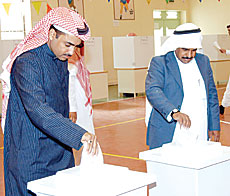RIYADH, 11 February 2005 — February 10 will go down in the books as the day Saudi citizens exercised their voting rights. In the first-ever elections held in the country, citizens over 21 headed to polling centers early in the day to choose their representatives for the Riyadh Municipal Council.
An average 82 percent of registered voters cast their ballots in Riyadh, according to Muhammad Al-Nagadi, deputy chairman of the Election Commission. The number was larger in the province of Riyadh where “93 percent voted, which is one of the highest turnouts in the world,” he added.
Polling stations closed in and around Riyadh at 5 p.m., nine hours after voters started flocking into the centers to pick half the members of 38 municipal councils (a total of 104 candidates) in the region.
The voting took place in a relaxed atmosphere amid low-key security. The Election Supervision Council confirmed the voting went off smoothly. “We have deployed 240 trained supervisors at polling stations in and around Riyadh to ensure that voting and counting are held properly and fairly,” said Bandar Al-Hejar, chairman of the council.
About 150,000 men out of 470,000 eligible voters registered to cast ballots in the first round of the three-phase elections, in which half the members of 178 municipal councils will be elected across the Kingdom. The other half will be appointed by the government.
Many were excited by their first experience. “It took a long time to get here but we’ve broken through a psychological barrier, that we couldn’t deal with ballot boxes,” said university Professor Sulaiman Enezi, who raised his arms in triumph after casting his vote.
Ballot center No. 63, located in the vicinity of King Saud University, attracted many academics and intellectuals. However, the spotlight was on Ballot Center No. 60 in Al-Maathar district where members of the royal family and several government officials voted.
The polling center in the second precinct of Al-Naseem witnessed chaotic scenes when a police officer withdrew a number of ballot papers from some voters in order to organize the entry and exit to the polling center. Many voters considered this improper and a violation of the polling process. The organizing committee and security forces soon intervened to calm the situation.
The polling center in Al-Rawda district attracted a larger number of middle class people.
Women, who represent 50 percent of the population, were barred from elections. “We will recommend that women vote next time,” said Riyadh Mayor Prince Abdul Aziz ibn Ayyaf Al-Muqrin after casting his ballot in a center in eastern Riyadh.
Prince Bandar ibn Abdullah ibn Abdul Rahman also supported women’s vote. While casting his ballot in a sports hall in Riyadh’s Naziriyah district, he said: “I believe the religious scholars should have made a clear statement on this question.”
Although only local monitors observed the poll, a seven-member delegation from the European Parliament including two women dropped in at polling stations, having timed a visit to Saudi Arabia at the invitation of the Shoura Council to coincide with the ballot.
“It’s historic,” said John Purvis, a Euro MP from Scotland. The election is “a small step but it’s a first step. I think it (the reform process) will snowball and gain momentum,” said Purvis.
Abdul Aziz Al-Zaid, a 46-year-old civil servant who cast his ballot in a primary school turned polling center, had no doubt that the limited reforms initiated by Saudi rulers will take on a life of their own. “It’s good for him. He can see what the future will look like,” Zaid said, pointing at his teenage son Ziyad, whom he insisted on bringing along to witness the historic moment.
An election official said provisional results would be out within two days. But final results will not be announced until a few days later to allow time for candidates wishing to contest them to do so, he said.
As many as 140 polling stations were set up for voters to choose from a field of 1,818 candidates, 646 of whom stood in Riyadh proper to fill half of its 14-seat council.
Voting in the second round, which covers the Eastern Province and the southwest, will take place on March 3. Voters in the western regions of Makkah and Madinah, as well as the northern regions, will go to the polls on April 21 in the last round.
— Additional input from Ali Al-Enazi


